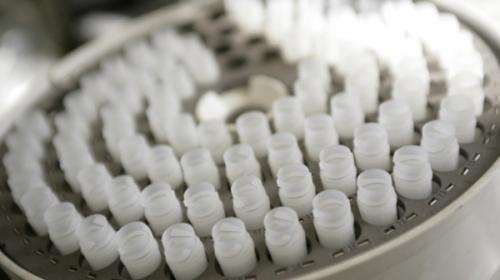Leukaemia gene provides clue to treating triple negative breast cancer

(Medical Xpress)—Cancer Research UK scientists have discovered that a gene previously linked to leukaemia could provide an urgently needed target for the development of drugs to treat patients with 'triple negative' breast cancer, according to a study published in PLOS ONE, today (Thursday).
The team of researchers at the Cancer Research UK Beatson Institute and University of Glasgow, measured levels of a protein produced by the RUNX1 gene in tumour samples from 483 patients with a range of breast cancer types*.
They found that patients with triple negative breast cancer who had the RUNX1 protein in their cells had poorer survival compared to those without the RUNX1 protein.
Of the 118 patients with triple-negative breast cancer, those who tested positive for the RUNX1 protein were around four times more likely to die from their cancer in the follow-up period – around 14 years on average – than those without it.
And the faulty gene could provide a target for the development of new drugs to treat the disease as well.
Every year between 4,800 and 16,100 women are diagnosed with triple negative breast cancer in the UK**.
The disease is often hard to treat as the cancer cells do not contain receptors for the hormones oestrogen or progesterone – targeted by hormone therapies such as tamoxifen – or receptors for the protein HER2, treatable with Herceptin.
RUNX1 plays an important role in controlling cell development and is one of the most commonly altered genes in leukaemia. But this is the first time it has been implicated in triple negative breast cancer.
Study author, Dr Karen Blyth, at the Cancer Research UK Beatson Institute and University of Glasgow, said: "Because levels of RUNX1 appear to be linked to triple negative breast cancers, this opens up the exciting possibility of using it as a new target for treatments.
"Now we've got to prove this early research in larger studies and pin down exactly what's happening in these cells, to understand how this protein behaves in triple negative breast cancer tumours."
Dr Kat Arney, Cancer Research UK's science communications manager, said: "There's still so much we need to understand about triple negative breast cancers, as they can be harder to treat in some people.
"Almost two out of three women with breast cancer now survive their disease beyond 20 years. But more must be done and we urgently need more studies like these, particularly in lesser-understood forms of the disease, to build on the progress we've already made and save more lives."
More information: Ferrari N, Mohammed ZMA, Nixon C, Mason SM, Mallon E, et al. (2014) "Expression of RUNX1 Correlates with Poor Patient Prognosis in Triple Negative Breast Cancer." PLoS ONE 9(6): e100759. DOI: 10.1371/journal.pone.0100759


















